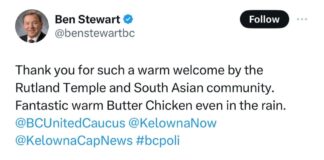WHO owns this road? Who can use it? These are critically important questions, especially in rural and remote areas.
In a new report, Ombudsperson Jay Chalke calls on the Ministry of Transportation and Infrastructure (MOTI) to address problematic road legislation that has real-life consequences for many British Columbians.
“This legislation continues to give rise to problems and disputes between neighbours, private citizens and government,” said Chalke on Tuesday. “It needs to be fixed, to protect the public interest and address an ongoing injustice.”
Complaints examined in the Ombudsperson’s report, On the Road Again, arose from the peculiar operation of section 42 of the Transportation Act, which states that in some cases, when public money is spent on maintenance, roads on private property can automatically be deemed to be public.
This can occur without the property owner’s knowledge or consent. Furthermore, unlike other methods of creating highways, property owners are not compensated for the reduction in the size of their property when highways are created this way. As well, property owners have no easy way to determine the ownership of roads they use to access or cross their property. Roads created in this manner are not registered in the land titles system.
This report examines two complaints to the Ombudsperson that illustrate how uncertainty around road ownership can negatively impact property owners.
- In one case, a property owner believed a road through her property was private, when in fact it was public. She was understandably surprised when she learned she would not be able to prevent logging trucks from using the road through her property.
- Another property owner had used what he believed was a public road to get to his own property. When other property owners blocked the road, he asked MOTI to remove the blockage, but the ministry would not do so because it was not a public road.
Both property owners had to try to determine the status of these roads by accessing and reviewing decades-old historical documents held by MOTI.
The Ombudsperson’s investigations found that the Transportation Actsection that governs this practice is unjust. The findings of this investigation echo a similar report made by the office in 1985, which remains unaddressed.
The Ombudsperson’s recommendations to MOTI in this new report include:
- legislation changes to prevent new public roads from being created under section 42
- all existing section 42 roads be registered in the land title system
- MOTI develop a publicly accessible registry of roads created under section 42 and consider including roads in the registry on request as well as establishing a dispute resolution process
Implementation of the Ombudsperson’s seven recommendations arising from this investigation will help ensure that:
- private land is no longer expropriated unfairly
- uncertainty around road ownership is minimized
- the determination of whether a road is a public highway is done consistently and fairly
- legislation is applied consistently
MOTI has fully accepted and agreed to implement five recommendations. Although MOTI’s commitment to two other recommendations (registering section 42 roads in land titles and establishing a non-court dispute resolution process) is not clearly defined, it is sufficient for the Ombudsperson to also consider them accepted.












